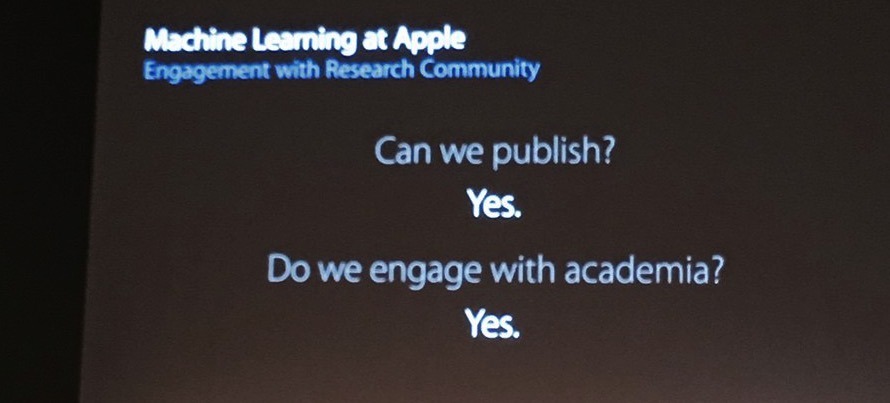After years of silence from Apple's researchers over fear of losing commercial intellectual property, the company is now allowing employees in artificial intelligence to not only publish their research, but also interface with other academics in the field to further the overall development of the technology.
At Tuesday's Neural Information Processing Systems (NIPS) conference, Apple Director of Artificial Intelligence Research Russ Salakhutdinov made the announcement on a slide during his presentation. The shift is a sea change in Apple's normal policies, with the company eschewing the more open approach that Facebook and Google take with their research and researchers.
Apple has found it historically difficult to recruit top minds in Artificial Intelligence, as the company's stance on preventing researchers from sharing findings, as well as the company's consumer privacy policies hindering product development has caused problems for researchers.
Beyond Siri, Apple appears to be branching out into other avenues of artificial intelligence and machine learning. In an interview in August, Apple CEO Tim Cook called AI one of Apple's core technologies for the future.
Apple will start publishing, according to @rsalakhu at #nips2016 pic.twitter.com/I0ndKKc2vB
— hardmaru (@hardmaru) December 6, 2016
Cook has also recently revealed that Apple's Yokohama, Japan, research facility will boast "deep engineering" for machine learning, far different from Apple's Siri voice assistant.
Apple is also rumored to be utilizing the technology for self-driving car systems, as an offshoot of the "Project Titan" whole-car program.
 Mike Wuerthele
Mike Wuerthele








 Chip Loder
Chip Loder
 Wesley Hilliard
Wesley Hilliard
 Marko Zivkovic
Marko Zivkovic

 Christine McKee
Christine McKee
 Amber Neely
Amber Neely

 Malcolm Owen
Malcolm Owen








43 Comments
I am glad to see Apple mixing it up in the AI realm with other scientist and engineers. Long overdue in this field! iMHO.
Nice to see that Apple can be flexible.
Good news. When their researchers can talk then Apple will benefit as well.
In some,cases, a rising sea floats all boats. This field of study will be advanced greatly by the free flow of information among the leading edge thinkers in Tech and by academics.
Their ability to hire just shot through the roof. Happy to see this development. Academics don't like working in the dark. It's not in their DNA. Literally.